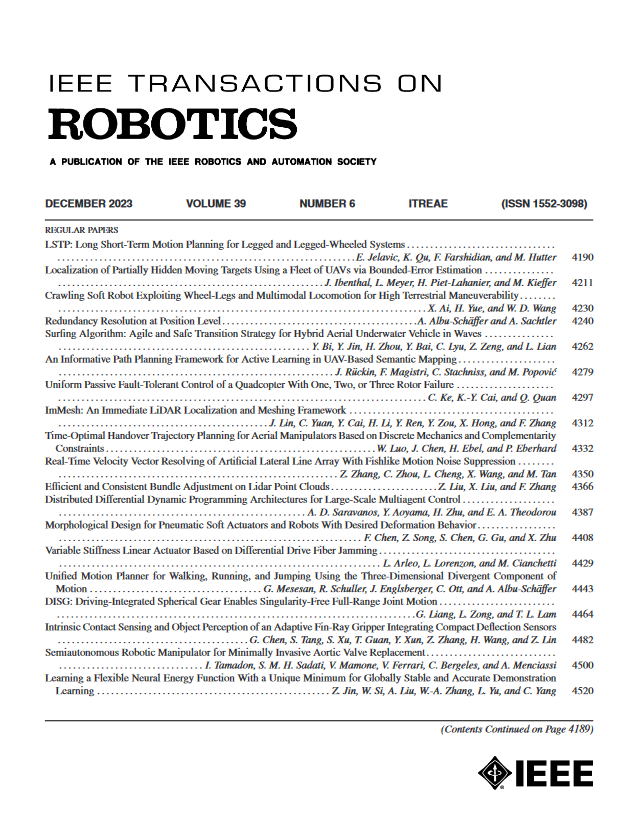AVOCADO: Adaptive Optimal Collision Avoidance Driven by Opinion
IF 9.4
1区 计算机科学
Q1 ROBOTICS
引用次数: 0
Abstract
We present AdaptiVe Optimal Collision Avoidance Driven by Opinion (AVOCADO), a novel navigation approach to address holonomic robot collision avoidance when the robot does not know how cooperative the other agents in the environment are. AVOCADO departs from a velocity obstacle's (VO) formulation akin to the optimal reciprocal collision avoidance method. However, instead of assuming reciprocity, it poses an adaptive control problem to adapt to the cooperation level of other robots and agents in real time. This is achieved through a novel nonlinear opinion dynamics design that relies solely on sensor observations. As a by-product, we leverage tools from the opinion dynamics formulation to naturally avoid the deadlocks in geometrically symmetric scenarios that typically suffer VO-based planners. Extensive numerical simulations show that AVOCADO surpasses existing motion planners in mixed cooperative/noncooperative navigation environments in terms of success rate, time to goal and computational time. In addition, we conduct multiple real experiments that verify that AVOCADO is able to avoid collisions in environments crowded with other robots and humans.牛油果:由意见驱动的自适应最优避碰
本文提出了一种基于意见驱动的自适应最优避碰方法(AVOCADO),该方法用于解决机器人不知道环境中其他智能体的合作程度时的完整机器人避碰问题。牛油果脱离了速度障碍(VO)的公式,类似于最优互反避碰方法。然而,它没有假设互惠,而是提出了一个自适应控制问题,以实时适应其他机器人和代理的合作水平。这是通过一种新颖的非线性意见动态设计实现的,该设计仅依赖于传感器观察。作为副产品,我们利用来自意见动态公式的工具来自然地避免几何对称场景中的死锁,而这种死锁通常会遭受基于vo的规划者的困扰。大量的数值模拟表明,在混合合作/非合作导航环境中,AVOCADO在成功率、目标时间和计算时间方面都优于现有的运动规划器。此外,我们进行了多次真实实验,以验证鳄梨能够在拥挤的其他机器人和人类环境中避免碰撞。
本文章由计算机程序翻译,如有差异,请以英文原文为准。
求助全文
约1分钟内获得全文
求助全文
来源期刊

IEEE Transactions on Robotics
工程技术-机器人学
CiteScore
14.90
自引率
5.10%
发文量
259
审稿时长
6.0 months
期刊介绍:
The IEEE Transactions on Robotics (T-RO) is dedicated to publishing fundamental papers covering all facets of robotics, drawing on interdisciplinary approaches from computer science, control systems, electrical engineering, mathematics, mechanical engineering, and beyond. From industrial applications to service and personal assistants, surgical operations to space, underwater, and remote exploration, robots and intelligent machines play pivotal roles across various domains, including entertainment, safety, search and rescue, military applications, agriculture, and intelligent vehicles.
Special emphasis is placed on intelligent machines and systems designed for unstructured environments, where a significant portion of the environment remains unknown and beyond direct sensing or control.
 求助内容:
求助内容: 应助结果提醒方式:
应助结果提醒方式:


